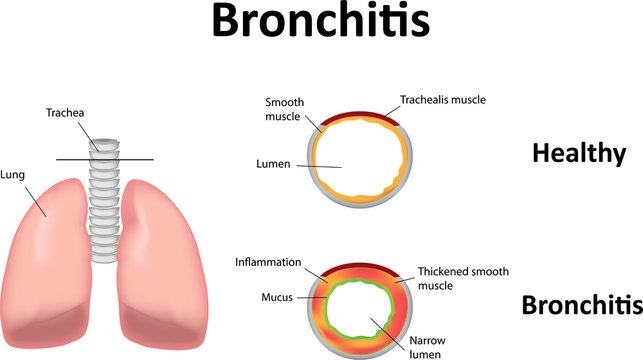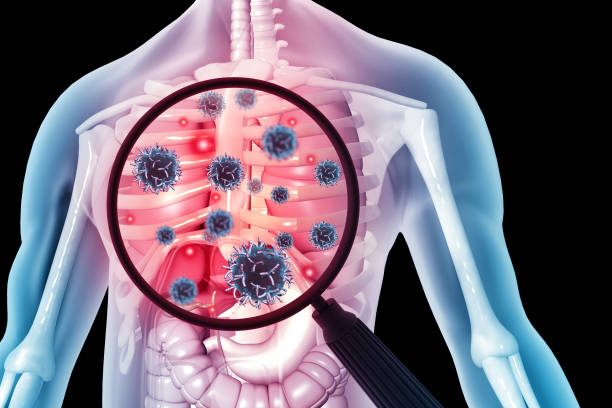Bronchitis: Causes, Symptoms, Diagnoses & Natural Cure

Bronchitis is a respiratory condition characterized by inflammation of the bronchial tubes, which are the air passages that carry air to and from the lungs. This inflammation leads to symptoms such as coughing, mucus production, and difficulty breathing.
It manifests in two primary forms: acute and chronic.
- Acute bronchitis: occurs suddenly and is often triggered by viral or bacterial infections like the common cold or influenza. It is a temporary condition that usually resolves within a few weeks, causing short-term discomfort.
- Chronic bronchitis: On the other hand, this type persists over an extended period, usually at least three months for two consecutive years. It is commonly associated with smoking and long-term exposure to irritants. Chronic bronchitis is primarily caused by prolonged exposure to irritants like tobacco smoke or air pollution. It is a persistent ailment.
Those at risk for this inflammation include;
- Individuals who smoke are more prone to chronic bronchitis due to the irritation and damage caused by cigarette smoke to the bronchial tubes.
- People working in industries with high levels of dust, chemicals, or pollutants may develop this inflammation.
- Individuals with compromised immune systems, such as the elderly or those with certain medical conditions, are more susceptible.
- Frequent exposure to respiratory infections, like colds and the flu, can increase the risk of acute bronchitis.
Table of Contents
How severe is bronchitis?

It varies in severity. It usually starts as an acute condition, causing coughing and chest discomfort. However, with proper care, it often clears up within a few weeks. So, is bronchitis permanent? No, it is typically temporary.
The duration of the illness depends on its type. Acute bronchitis usually goes away within 2-3 weeks, while chronic bronchitis, which is more long-lasting, can persist for months or even years if left untreated. Therefore, how long does bronchitis last? It varies, but with prompt treatment and a healthy lifestyle, it is easy to recover from the inflammation quickly.
Read On: Postpartum Rage: Causes, Symptoms & How to Deal with Mom Rage.
Causes: How do you get bronchitis?
This throat inflammation starts when the bronchial tubes, which carry air to and from the lungs, become inflamed. This inflammation is often caused by a viral or bacterial infection.
Here are its common causes:
Viral Infections
The most common cause of acute bronchitis is viral infections, such as the common cold or the flu. These viruses can irritate the bronchial tubes and lead to inflammation.
Bacterial Infections
Less frequently, acute bronchitis can be caused by bacterial infections, like those caused by Streptococcus pneumoniae or Haemophilus influenzae.
Irritants
Prolonged exposure to irritants like tobacco smoke, air pollution, dust, or chemical fumes can also trigger the inflammation. Chronic bronchitis, in particular, is often associated with long-term exposure to these irritants.
Allergies
Allergies to pollen, dust mites, or other airborne allergens can sometimes lead to bronchitis symptoms, especially in individuals with preexisting respiratory conditions.
Preexisting Conditions
People with preexisting lung conditions, such as asthma or chronic obstructive pulmonary disease (COPD), may be more susceptible to throat inflammation.
Smoking and Secondhand Smoke
Smoking and exposure to secondhand smoke are significant risk factors for bronchitis. The chemicals in tobacco smoke can irritate and damage the bronchial tubes, making them more susceptible to infections.
Air Pollution
High levels of air pollution, such as particulate matter and toxins in the air, can contribute to this inflammation by irritating the respiratory system.
Occupational Exposure
Some occupations involve exposure to harmful substances, like dust, chemicals, or fumes, which can increase the risk of developing throat inflammation.
Symptoms: When should you suspect bronchitis?

- Cough: A persistent, often productive cough (producing mucus or phlegm) is one of the hallmark symptoms of bronchitis. If your cough lasts for more than a few weeks or is particularly severe, it may be a sign of bronchitis.
- Chest Discomfort: People with the illness often experience chest discomfort or a feeling of tightness in the chest. This discomfort can be mild to moderate and is typically associated with coughing.
- Mucus Production: Increased mucus production is common. The mucus may be clear, white, yellow, or green, depending on the severity and cause of the bronchitis.
- Shortness of Breath: Some individuals with this illness, especially those with chronic bronchitis or underlying lung conditions, may experience shortness of breath. This can be more noticeable during physical activity or at night.
- Fever and Fatigue: While not always present, acute bronchitis can sometimes be accompanied by a low-grade fever and overall fatigue. These symptoms are more common when the cause is a bacterial infection.
For You: Thinspo: Effects on Body, Mental and Physical Health.
Acute vs. Chronic Bronchitis Symptoms
Acute bronchitis typically presents with the above-mentioned symptoms and is often caused by viral infections. It is usually a short-term condition that lasts for a few weeks, and fever and fatigue may be more common with viral-induced acute bronchitis.
Chronic bronchitis comes with persistent cough and mucus production for at least three months in two consecutive years. Individuals with chronic bronchitis may have recurrent acute exacerbations of their symptoms. Long-term exposure to irritants, such as smoking or environmental pollutants, is a common cause of this inflammation.
Related: Seronegative Arthritis: Symptoms, Diagnosis, and Treatment.
Diagnoses: How do I check myself for bronchitis?

Diagnosing this inflammation involves a healthcare provider’s evaluation, as self-diagnosis may not be accurate.
Your healthcare provider will start by taking a detailed medical history, including asking about your symptoms, their duration, and any relevant medical conditions.
A physical examination will be conducted to assess your respiratory system. Your provider will listen to your lungs with a stethoscope and may ask you to cough to evaluate your lung function and check for any abnormal sounds.
Tests
- Chest X-ray: In some cases, a chest X-ray may be ordered to rule out other potential causes of your symptoms, such as pneumonia or other lung conditions. It can help visualize the condition of your lungs and rule out structural abnormalities.
- Pulmonary Function Tests: These tests assess your lung function and can help determine if there is any obstruction in your airways. Spirometry is a common pulmonary function test used to measure how much air you can inhale and exhale and how quickly you can do so.
- Sputum Culture: If your healthcare provider suspects that a bacterial infection may be the cause, they will request a sputum culture. This involves collecting a sample of the mucus (sputum) you cough up and sending it to a laboratory for analysis to identify the specific bacteria responsible.
How bronchitis feels at first
When it starts, your throat will itch you. You might notice increasing fatigue or a feeling of general malaise. A mild cough that starts dry but may later produce mucus comes.
Then, you might feel slightly congested or have a mild discomfort in your chest.
Check out: Is milk good for ulcers?
Do you need antibiotics for bronchitis?
Most cases of the acute form are caused by viral infections, and antibiotics are not effective against viruses. If your bronchitis is viral, antibiotics won’t help, and your body’s immune system will typically clear the infection on its own.
Antibiotics are prescribed if your healthcare provider suspects that a bacterial infection is the cause of your bronchitis or if you have a preexisting lung condition like chronic obstructive pulmonary disease (COPD).
Can it be self-treated?
Mild cases of the acute form of this inflammation can be managed at home with self-care measures:
- Get plenty of rest.
- Stay well-hydrated by drinking fluids.
- Use a humidifier or take hot showers to ease congestion.
- Over-the-counter cough suppressants or expectorants may help alleviate symptoms.
- Pain relievers like ibuprofen or acetaminophen can relieve discomfort and reduce fever if present.
Cure: How do you cure bronchitis fast?
For bacterial bronchitis, antibiotics are prescribed and they do a great healing job. Additionally, cough suppressants can help ease discomfort. Bronchodilators also alleviate bronchitis symptoms.
Stop smoking totally to quicken recovery. Avoid irritants like smoke and pollution to prevent exacerbation. If possible, try pulmonary rehabilitation as part of your recovery plan.
Lastly, Don’t forget to take the necessary vaccinations.
Rwad Also: Milk for heartburn: Is Milk Good for Heartburn or Ingestion (Acid Reflux)?
How do you treat bronchitis fast naturally? Herbs and Others
To clear your chest from bronchitis quickly and naturally, you can employ several effective methods.
First, consider incorporating herbal remedies into your routine. Herbs like Echinacea, ginger, thyme, and raw garlic are known to help alleviate bronchitis symptoms. Ginger is very helpful, as it possesses properties that can aid in bronchitis recovery.
Additionally, steam inhalation is a simple yet effective technique. Inhaling steam soothes your airways and ease congestion, providing fast relief.
Always stay hydrated. Drinking plenty of fluids helps thin mucus and keeps your throat moist, making it easier to clear your chest.
Don’t underestimate the power of rest and sleep. Giving your body adequate time to heal is essential in speeding up your recovery process.
Another natural remedy is the combination of honey and lemon. Mix honey and lemon in warm water and drink it to soothe your throat and alleviate bronchitis symptoms.
Lastly, doing saltwater gargles helps reduce throat discomfort and promote healing.
Prevention
Preventing bronchitis is essential for maintaining good respiratory health. Here are some effective strategies to keep bronchitis at bay:
- Regularly washing your hands with soap and water can help prevent the spread of viruses and bacteria that can lead to bronchitis.
- Smoking is a significant risk factor for bronchitis. If you smoke, quitting is the best step you can take. Additionally, avoiding exposure to secondhand smoke is crucial in preventing bronchial irritation.
- Take measures to improve indoor air quality, such as using air purifiers and ensuring proper ventilation. Avoid exposure to environmental pollutants and irritants that can contribute to bronchitis.
- Vaccinations, such as the flu shot, can help prevent respiratory infections that may lead to bronchitis. Staying current with recommended vaccinations is an important preventive measure.
- A robust immune system can help your body fight off infections more effectively. To strengthen your immune system, maintain a balanced diet, get regular exercise, manage stress, and ensure you get enough sleep.
What foods should be avoided in bronchitis?
When dealing with bronchitis, it’s a good idea to avoid certain foods that can exacerbate symptoms or hinder your recovery. Here are foods to steer clear of:
- Dairy Products: Dairy can increase mucus production and make congestion worse. Avoid milk, cheese, and yogurt when you have bronchitis.
- Processed and Fried Foods: These foods can be high in trans fats and contribute to inflammation, which can worsen bronchitis symptoms.
- Sugary Foods and Beverages: Sugar can weaken the immune system and promote inflammation. Avoid sugary snacks, soda, and desserts.
- Caffeine and Alcohol: Both can dehydrate you, making it harder to expel mucus and recover from bronchitis. Limit your consumption of coffee, tea, and alcoholic beverages.
- Spicy Foods: Spices can irritate the throat and worsen coughing and inflammation. It’s best to avoid spicy dishes when you have bronchitis.
- Cold and Icy Drinks: Extremely cold beverages can make mucus thicker and harder to clear. Opt for warm or room-temperature liquids instead.
- Allergenic Foods: If you have known food allergies or sensitivities, avoid them as they can exacerbate bronchitis symptoms.




One Comment